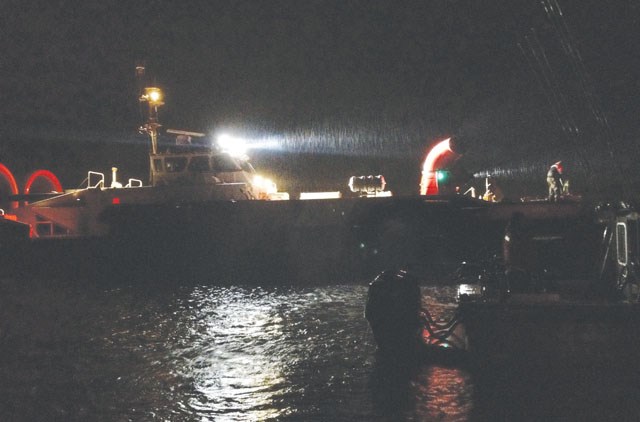The Canadian Coast Guard’s plan to “lean on the local agencies” once it cuts its resident dive team appears to be news to local emergency services.
After announcing last week that it’s removing the team from its Sea Island base and re-deploying the highly-trained staff elsewhere, a Coast Guard official said it would be relying on the local service providers, such as Richmond RCMP, Richmond Fire-Rescue and the Vancouver Police Department (VPD), adding that “search and rescue is always a shared responsibility.”
However, a spokesperson for the BC RCMP said the primary focus of its Underwater Recovery Team (URT) — based on Annacis Island — is the “recovery of human remains and evidence related to criminal investigation.”
The RCMP, according to Annie Linteau, senior media relations officer, said the situation has still to be discussed with the Coast Guard, as well as with other impacted stakeholders.
Linteau said most are part of the (URT) team on a part-time basis and that “being part of the team is not their primary duty.”
Richmond Fire-Rescue’s deputy fire chief, Tim Wilkinson, said his department has contacted the Coast Guard after the news broke, but no discussions have taken place.
Wilkinson did tell the News, however, that Richmond Fire-Rescue has surface rescue capability, but does not have the capability to rescue below the surface of the water.
The VPD has a marine unit that maintains security and safety on the water and responds to distress calls, but it also has no dive team and has no plans to deploy one.
The Coast Guard’s 26-strong team of search and rescue divers had been charged with responding to emergencies in the waters off the Lower Mainland and are trained to enter wrecked or sunken ships, vehicles and planes to rescue survivors or recover bodies.
“Those hovercraft still need to run, rescue specialists still have to be there,” suggested Roger Girouard, the assistant commissioner for the Coast Guard’s western region.
The dive team is the only one of its kind across the country, and it was decided the program was not part of the Coast Guard’s core mandate, according to a statement from the Department of Fisheries and Oceans.
The cut will save the Coast Guard about $500,000 a year, but it will leave the region less prepared to respond to emergencies where dives are required.
Girouard said members of his staff are talking to the RCMP, Emergency Management B.C., the VPD and Vancouver Fire and Rescue about the change, and the Coast Guard will wait “to make sure that 9-1-1 knows who to call” before it cuts the team.
The dive team has been cut once before by a federal Liberal government, in 2001, just a few days before a man crashed his car into the Fraser River and died.
On that occasion, Coast Guard officials were on site, but didn’t have the equipment to go in and enter the vehicle and remove the occupant, instead having to wait until the RCMP dive team was able to get on site and, by that time, it became a recovery.
But Girouard said the cut comes in the midst of “investment in the Canadian Coast Guard of a massive, unprecedented scale not seen in well over a generation.”
He referred to Prime Minister Justin Trudeau’s recent financial commitment of $1.5 billion over five years for a national Oceans Protection Plan. He said the Coast Guard will get 200 more staff in B.C. alone, and the province will get four new lifeboats and new radar and radio capabilities.
Mariners across the province would be “better protected” overall as a result of the investments and changes, he said.
— With a file from the Vancouver Sun



